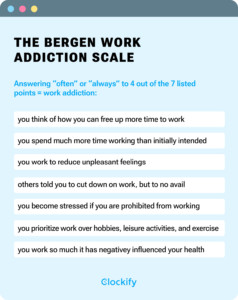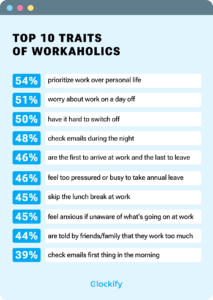Article Summary:
Everything you need to know about workaholism (work addiction): its prevalence, signs, causes, and costs—and how to overcome it.
+++
Many people today struggle with workaholism—being addicted to work and struggling to switch it off or stop thinking about it
Psychologist Wayne Oates coined the term “workaholism” in 1971 in his book, Confessions of a Workaholic: The Facts About Work Addiction. He defined it as “the compulsion or the uncontrollable need to work incessantly.” In 2014, researchers C.S. Andreassen, J. Hetland, and S. Pallesen defined work addiction as “being overly concerned about work, to be driven by strong and uncontrollable work motivation, and to spend so much energy and effort into work that it impairs private relationships, spare-time activities, and/or health.”
According to researchers, work addiction has both a behavioral component (working long hours consistently) and a psychological component (being obsessed with work). It’s a serious problem for many.
A Cautionary Tale About Workaholism
Gerald Chertavian grew up in a working-class neighborhood in Lowell, Massachusetts with a strong work ethic. After business school, he moved to London to be with his fiancée. Following a frustrating first job experience there, he was approached with an opportunity to buy into a technology company on the verge of bankruptcy. They had precious little to go on, but he decided to go for it.
The challenges were fierce, but Gerald was committed. For years, he pushed and pushed, until one day it was too much. As he told us in an interview for LIFE Entrepreneurs:
“I looked over the side of my desk in London. It was 2 a.m. and I couldn’t see the ground. It was just black. I couldn’t even see the rug below me. It was like looking into the abyss.”
-Gerald Chertavian
This talented and vigorous young man early in his career could have worked himself to death. It was a stark wake-up call.
The Value of Hard Work
Concerns about workaholism shouldn’t be equated with a critique of hard work. There’s incredible value in hard work (especially in smart hard work), from opportunities for learning and growth to success and wealth creation.
At the opposite end of the spectrum, there’s another problem: sloth. Many people fall into the trap of not working hard enough and later come to regret it.
Aristotle famously wrote about the “golden mean” of virtue between two vices. So, between sloth and overwork, the golden mean is hard work—ideally work with purpose, passion, and impact. But that’s a far cry from work addiction.
Workaholism shouldn’t be conflated with hard work, a strong work ethic, dedication, conscientiousness, loving what we do, or occasionally working extra hard to complete an important task. These are all good. By contrast, workaholism takes us into the territory of preoccupation, compulsion, and addiction, with the associated loss of self-control and continuation of excessive work despite negative consequences.
If we love our work, that doesn’t mean we’re addicted to it. But if we’re a workaholic, it’s easy to convince ourselves that we work so much because we love it or because we need to when we actually don’t.
Workaholism is also not the same as having an overly demanding boss who piles way too much work on our plates—or as the excessive work sometimes demanded by startups, turnarounds, or crises. Work addiction, in short, is not the same as work overload. (That’s a different problem.)
The Prevalence of Workaholism
The prevalence of workaholism is hard to pin down because it’s hard to define precisely and even harder to measure. And even when it gets measured, there are challenges with getting nationally representative data sets.
Nonetheless, psychologists estimate that about 10% of Americans struggle with work addiction. Research from a nationally representative random sample in Norway using the Bergen Work Addiction Scale found that 8.3% of the population there struggles with work addiction.
These may not be huge percentages, but they add up to massive numbers of people. According to Zippia Research, 55% of Americans (55%) didn’t use all of their paid time off in 2022.
Researcher Brene Brown jokes that when they start having support meetings for workaholics, they’ll have to rent out football stadiums.
Signs of Workaholism
How to know if we struggle with workaholism? It comes with a number of telltale signs, including:
- feeling preoccupied with work even outside normal working hours (we can’t stop thinking about it)
- being the first one in the office and the last to leave
- not taking a lunch break and other breaks
- working often on weekends*
- working more than is needed or expected of them
- having a hard time stopping work
- feeling physical and emotional distress when we’re not working, much like the withdrawal symptoms from other addictions
- lacking margin in our lives and suffer from “time poverty” (an acute feeling of having too much to do and not enough time)
- sacrificing time with our spouse/partner, children, and friends because we’re so consumed with work
- suffering negative consequences from working so much, whether physically, relationally, or otherwise.
The Bergen Work Addiction Scale is a psychometrically validated assessment instrument developed by testing 12,000 Norwegian workers from 25 different industries. See the image below and consider doing a quick check.

According to the research, workaholics tend to be status-conscious, hyper-competitive, and achievement-oriented. They have high standards (e.g., must be the best) and tend to be self-critical. Often, they have a strong need for success and external validation.
Workaholics may also struggle with close relationships, vulnerability, and intimacy due to a fear of disclosing flaws. And they may neglect their inner life given their focus on external achievements.
Edward Hallowell writes in his book, Crazy Busy, that it can become a habit so entrenched that it makes you “a slave to a lifestyle you don’t like but you can’t escape.” According to Clockify, a company that helps organizations track how much time people spend working on tasks, the top ten traits of workaholics are the following:

Workaholism can show up in different ways. For some, it may be a standard compulsion that’s fairly consistent over time. For others, it gets progressively worse. And for others, it involves binge-working in fits and starts.
Some people are good at hiding their workaholism from others, knowing that it brings conflict or disappointment, so they sneak in work when others can’t see it.
According to researchers, workaholics often make things harder for themselves by placing more pressure on themselves, making their work more complicated than necessary, and hesitating to delegate work when possible or to seek social support when they’re struggling. They may also be attracted to high-pressure jobs with intense demands.
Causes: Where Workaholism Comes From
Where does workaholism come from? Researchers have discovered several sources. Here are the main ones:
Childhood causes. Many workaholics grew up with overly demanding or overly protective parents. This can set up long-term behavioral patterns that can be difficult to escape.
Our identity. Author Stephen R. Covey noted that some people have a work-centered identity. (See my article, “Is Your Identity Wrapped Up Too Much in Your Work?”)
In her book, The Gifts of Imperfection, Brene Brown notes that some people consider exhaustion a status symbol and view “productivity as self-worth.” Others have an achievement identity. Shirzad Chamine, best-selling author and chairman of the Coaches Training Institute, has identified what he calls a “hyper-achiever” as one of ten “saboteurs” that inhibit our effectiveness and enjoyment:
“The Hyper-Achiever makes you dependent on constant performance and achievement for self-respect and self-validation. It keeps you focused mainly on external success rather than on internal criteria for happiness. It often leads to unsustainable workaholic tendencies and causes you to fall out of touch with deeper emotional and relationship needs. Its lie is that your self-acceptance should be conditional on performance and external validation.”
-Shirzad Chamine, Positive Intelligence
Emotional causes. If we feel guilty or anxious when we’re not working, it’s easy to numb those feelings by working incessantly. Some people suffer from “productivity guilt”—having a constant nagging feeling that we should be doing more.
Personality factors. Many workaholics struggle with perfectionism, neuroticism, or obsessive-compulsive tendencies. They may have a “Type A” personality characterized by ambition, aggressiveness, and intense achievement striving.
Running from pain. At a deeper level, workaholism is sometimes more about running away from something that running toward the glories of work. There may be great emotional pain, discomfort, shame, or trauma driving it.
“…workaholism is a surprisingly effective distraction from emotional and spiritual problems.”
-David Brooks, The Second Mountain
There’s an interesting question about the direction of causality here. It’s clear that workaholism can and often does lead to significant distress in our lives. But researchers have discovered that, for many people, workaholism is also a response to distress in their lives, such as emotional disturbance or anxiety. In other words, it’s caused by distress but also adds to distress, a double whammy.
“We are a culture of people who’ve bought into the idea that if we stay busy enough,
the truth of our lives won’t catch up with us.”
-Brene Brown, Daring Greatly
Fear. Sometimes the compulsion to work and work comes from a place of fear—fear of not being enough or of disappointing people. Seen in this light, work addiction becomes a matter of overdoing things to avoid the things we’re afraid of (but too often doing damage in the process).
Motivational factors. If we’re highly motivated by extrinsic factors like financial or status rewards, we can tell ourselves that working all the time will bring us the satisfaction and happiness we crave. (See “The Most Common Myths About Happiness.”)
Cultural influences. Some organizations and even nations have a culture that lionizes work and achievement over other values. People living in different countries can have widely varying outlooks on the importance of work.
“American culture valorizes overwork, which makes it easy to slip into a mindset that can breed success addiction.”
-Arthur Brooks, From Strength to Strength
The Problem with Workaholism
Workaholism, like all addictions, can come with a high—sometimes devastating—cost. Here are some of the problems it can cause in different areas of our lives:
Workaholism can contribute to physical health problems, including:
- cardiovascular disease
- higher systolic blood pressure
- insomnia
These are all serious problems. Notably, some languages now have words for “death from overwork” (karoshi in Japanese and guolaosi in Chinese).
It can also contribute to mental health problems, including:
- higher levels of mental distress and emotional exhaustion
- chronic stress
- anxiety
- depression
Workaholism can lead to relationship problems, including::
- less time with family and friends
- more work-family conflicts
Workaholism can have negative effects on our work, including:
- more job stress
- greater chance of burnout
- lower job satisfaction
“Findings suggest that workaholism is related to negative outcomes such as increased job stress, work–life conflict, burnout, decreased job and life satisfaction, and poor physical and emotional/mental health…. workaholism was not related to higher levels of performance or job satisfaction; rather, it was related to many negative outcomes such as burnout, job stress, lower job satisfaction, and poorer emotional/mental and physical well-being.”
-Malissa Clark et al., “All Work and No Play?”
Researchers note that work addiction doesn’t necessarily lead to better performance. That makes sense because we’re all human and have limits. At some point, there are diminishing marginal returns for the extra work put in.
Workaholics may get a short-lived rush from completing an important project, but they quickly turn their attention to the next item on their to-do list, placing them squarely on the hedonic treadmill.
Workaholism also leads to lower life satisfaction and more life regrets. In her work as a palliative nurse, Bronnie Ware noted the top regrets of people who were in the process of dying. The second most common regret among her patients was this:
“I wish I hadn’t worked so hard.”
Her point here isn’t that hard work is bad in and of itself.
The problem is when we let our work crowd out so many other important things such as our health and close relationships with family and friends. By working too much, we’re optimizing for one aspect of our lives (our work) while harming other important aspects.
The Secondary Effects of Workaholism
Unfortunately, the negative effects don’t stop there. There are also secondary effects of work addiction that spill over into other domains.
For starters, workaholism can lead to secondary addictions (e.g., to alcohol, drugs, pornography, etc.).
According to empirical research, work addiction is also related to poor family relationships, family dysfunction, and marital dissatisfaction. Writer John Eldredge likened it to having an affair with his work.
It can lead to neglecting children or missing family events and milestones (e.g., the birth of a child, sports tournaments, dance recitals, graduations). (See my article, “Five Words that Changed Me as a Parent.”)
Work addiction in parents can lead to problems with their children’s mental health. According to a 2022 study of 527 Lithuanian workers, “perceived work addiction of both mother and father was related to higher levels of work addiction of their adult child.”
And what are the opportunity costs of all these extra hours spent working instead of engaging in other worthy endeavors? For example, how can we take care of our aging parents and grandparents or struggling relatives if we’re so consumed with our work?
Also, our communities and nations suffer when many people are addicted to work. How can people find time to build community and participate actively as citizens when they’re working so much?
The physical exhaustion associated with work addiction can also lead to ethical lapses. According to former President Bill Clinton, “Every important mistake I’ve made in my life, I’ve made because I was too tired.”
What’s more, workaholism may be contagious in some workplaces. According to researcher G. Spruell, “Workaholism practiced by even just one member of a work group can suck the spirit right out of the team” and can cause “destructive competitiveness among coworkers.” Overly demanding leaders can create a toxic culture of workaholism in their organization, leading to dissatisfaction, resentment, burnout, absenteeism, high turnover, lower performance, and great personal damage and regret among workers.
What to Do About Workaholism
Addressing the problem is difficult because many workaholics are in denial about their addiction (see “Self-Deception: Why We Do It and How to Stop It”)—and because many workplaces reward people for workaholic behavior.
“…work 16 hours a day, and you’ll probably get a promotion.”
-Arthur Brooks, “The Hidden Link between Workaholism and Mental Health”
Thankfully, there are many things we can do to address work addiction:
Track our time. Carefully log how we spend time for several days (or a week). Then go back and review which activities give us energy and a sense of meaning, versus which ones drain us or seem pointless. Consider whether the amount of time we’re spending working versus addressing other important priorities accurately reflects our core values.
Be brutally honest with ourselves. Stop avoiding and pretending. Decide to push past self-denial and face the reality and implications of our choices.
Ask those who know us best. Sometimes, it’s hard for us to see or admit but all too clear to others.
Set boundaries on our work time. Set a weekly maximum number of hours and limit email to certain hours, except under extraordinary circumstances. According to a February 2023 Pew Research Center study, workers with higher incomes and postgraduate degrees were most likely to say they regularly respond to work emails and messages outside of work hours. Though many people are rightly concerned about the exploitation of lower-income workers, it seems that many upper-income workers and managers are exploiting themselves.
Focus on only a few key priorities each day. Avoid the trap of being overly ambitious with expected accomplishments each day. That can set us up for a cycle of stress and overwork. Being realistic about daily and weekly accomplishments can help a lot. (Consider using the Ivy Lee Method: give ourselves no more than six important tasks per day, listed from most important to least important. Then address them in order of priority, and without moving to the next task until the current one is complete.)
Schedule important, non-work priorities. This can help make sure that other important priorities don’t get crowded out of our busy schedules.
Be intentional about time away from work. When we’re used to working hard, it can be easy to become unintentional and passive when we have free time. There’s nothing wrong with chilling out, but if we let it turn into mindless numbing with too much binge-watching or doom-scrolling, it will only make us more anxious and tired. Meanwhile, we’ll have lost important opportunities to connect with family and friends and to do fun things.
“Unless a person takes charge of them, both work and free time are likely to be disappointing.”
-Mihaly Csikszentmihalyi, psychologist and author
Think about who we’re giving so much of our lives away to—and whether they’re worth it. In her article, “The Wages of Overwork,” writer and journalist Ann Helen Petersen writes, “Leaders are more than happy to exploit workers’ most anxious or engrained inclinations towards overwork.”
Make sure we’re giving enough time to the important people in our lives. According to research, our close relationships are the most important contributors to our happiness and quality of life.
Address the underlying issues that cause us to seek refuge in overwork. Do the inner work of discovering what’s causing us to engage in overwork and what we’re running from. These insights can give us clarity about the problem(s) we must address.
Be clear about our purpose and values. This helps us focus on what’s most important in our lives.
Develop good habits of recovery, renewal, and self-care such as:
- Good and regular sleep
- Healthy eating habits
- Physical movement and exercise
- Regular breaks
- Hobbies
- Meditation and mindfulness
- Time in nature with fresh air and sunlight
- Sanctuary (places or practices of peace and self-reflection)
Shift our focus from ego and personal achievement to connection with and service to others. Work addiction is often a selfish and lonely way of life. When we stay focused on connection and service, we can avoid getting trapped by our ego.
Remember our mortality. We will all die, and we don’t know when. Remembering this can help us determine what’s important in our lives right now.
Work with a therapist or join a support group (e.g., Workaholics Anonymous).
Regularly review how we’re doing in all the important areas of our lives. (See my Quality of Life Assessment—which you can set up for regular reminders.) By reviewing each area (e.g., family, health, friends, education, work, service, activities, finance), we can see which ones are neglected and problematic—and then take appropriate action.
“Imagine life as a game in which you are juggling five balls… work, family, health, friends, and spirit. Work is a rubber ball. If you drop it, it will bounce back. But the other four balls are made of glass. If you drop one of these, they will never be the same.”
-Brian Dyson, former CEO, Coca-Cola Enterprises
Coda: The Cautionary Tale
Remember Gerald starting into the abyss at 2 a.m. in his London office after years of overwork? Here’s what happened next:
“Right there, I realized that I wasn’t doing what I needed to do with my life. Then I went home and gave myself grades as a father, husband, friend, community member, and businessperson, and I only got one A—and the A was as a businessperson. I said that’s the last time in my life I’m going to look in the mirror and give myself those grades, period.”
-Gerald Chertavian**
Reflection Questions
- Are you suffering from or at risk of work addiction?
- How is it affecting your health, relationships, and quality of life?
- What will you do about it?
- Which of the above practices will you start with?
Tools for You
- Traps Test (Common Traps of Living) to help you identify what’s getting in the way of your happiness and quality of life
- Quality of Life Assessment to help you discover your strongest areas and the areas that need work and then act accordingly
- Personal Values Exercise to help you clarify what’s most important to you
Related Articles & Traps to Workaholism
- “Taking Stock of Your Quality of Life”
- “The Problem with Not Having Boundaries”
- “Burnout”
- “Is Your Identity Wrapped Up Too Much in Your Work?”
- “Do You Have Margin in Your Life?”
- “The Power of Relationships in Our Lives”
- “The Hidden Trap Catching Many High-Achievers”
- “Time to Check the Path You’re On?”
- “The Perfectionism Trap—And How to Escape It”
- “Escaping the Trap of Our Ego”
- “Beware the Disease of More”
- “Are You Feeling Empty Inside?”
- “The Comparison Trap”
- “The Conformity Trap”
- “The Problem with Neglecting Our Inner Life”
- “Self-Care and Personal Resilience”
- “Ten Keys to Self-Leadership”
- “Avoiding Breakdowns”
- “Five Words that Changed Me as a Parent”
Postscript: Quotations on Workaholism
- “If you think your busyness is some kind of prestige symbol, think again.” -Chris Brogan
- “Busyness is not a marker of intelligence, importance, or success. Taken to an extreme, it is much more likely a marker of conformity or powerlessness or fear.” -Christine Carter
- “You cannot be really first rate at your work if your work is all you are.” -Anna Quindlen, writer
- “Overwork sucks us into a negative spiral, causing our brains to slow down and compromising our emotional intelligence.” -Annie McKee, author and advisor to top leaders
- “Everyone knows that if a child’s parent dies, the child will suffer with sadness, loss, and possibly depression. No one thinks about this being the case when a child loses a parent to success.” -Jonice Webb with Christine Musello, Running on Empty: Overcome Your Childhood Emotional Neglect
- “No matter how much value we produce today—whether it’s measured in dollars or sales or goods or widgets—it’s never enough. We run faster, stretch out our arms further, and stay at work longer and later. We’re so busy trying to keep up that we stop noticing we’re in a Sisyphean race we can never win.” -Tony Schwartz, journalist, author, founder, The Energy Project
- “My worry was that I would become addicted to success. It’s a delicate and dangerous zone—the interface between success and significance—to get as much success as you can without getting captured by it, becoming its prisoner.” -Bob Buford, Half Time
- “Every addiction arises from an unconscious refusal to face and move through your own pain. Every addiction starts with pain and ends with pain. That is why… there is so much unhappiness, so much pain… They bring out the pain and unhappiness that is already in you.” -Eckhart Tolle, The Power of Now
- “Human beings have always employed an enormous amount of clever devices for running away from themselves, and the modern world is particularly rich in such stratagems. We can keep ourselves busy, fill our lives with so many diversions, stuff our heads with so much knowledge, involve ourselves with so many people, and cover so much ground that we never have time to probe the fearful and wonderful world within. More often than not we don’t want to know ourselves, don’t want to depend on ourselves, don’t want to live with ourselves. By middle life, most of us are accomplished fugitives from ourselves.” -John W. Gardner, Self-Renewal
Sources:
- Andreassen, C. S., Hetland, J., & Pallesen, S. (2014). Psychometric assessment of workaholism measures. Journal of Managerial Psychology, 29(1), 7–24.
- Morkeviciute M., Endriulaitiene A. Understanding Work Addiction in Adult Children: The Effect of Addicted Parents and Work Motivation. Int J Environ Res Public Health. 2022 Sep 8;19(18):11279.
- Spruell, G. 1987. Work fever. Training and Development Journal, 41: 41-45.
* We should note that in today’s economy, many people choose to work nontraditional hours, as opposed to the standard Monday to Friday, 9 a.m. to 5 p.m. Of course, choosing to do so isn’t in and of itself a sign of work addiction.
** Gerald Chertavian and his team built that company, Conduit Communications, into one of Britain’s fastest growing companies, eventually having more than 130 workers in several countries and earning more than $18 million in annual revenues. Six years later they sold it for a significant return and made millionaires out of many of their colleagues in the process. He later founded YearUp, a national 501(c)3 workforce development organization committed to ensuring equitable access to economic opportunity, education, and justice for all young adults—no matter their background, income, or ZIP code.
++++++++++++++++++++++++++++++
Gregg Vanourek is a writer, teacher, and TEDx speaker on personal development and leadership. He is co-author of three books, including LIFE Entrepreneurs: Ordinary People Creating Extraordinary Lives (a manifesto for living with purpose and passion) and Triple Crown Leadership: Building Excellent, Ethical, and Enduring Organizations (a winner of the International Book Awards). Check out his Best Articles or get his monthly newsletter. If you found value in this article, please forward it to a friend. Every little bit helps!










